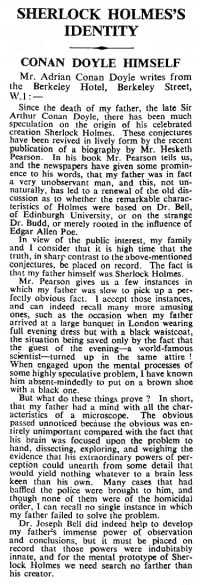Sherlock Holmes's Identity
Sherlock Holmes's Identity is an article published in The Times on 28 october 1943.
Letter written by Adrian Malcolm Conan Doyle (the 4th child of Arthur Conan Doyle) about the origin of Sherlock Holmes, asserting that his father was himself Sherlock Holmes.
Sherlock Holmes's Identity

CONAN DOYLE HIMSELF
Mr. Adrian Conan Doyle writes from the Berkeley Hotel, Berkeley Street, W.1:—
Since the death of my father, the late Sir Arthur Conan Doyle, there has been much speculation on the origin of his celebrated creation Sherlock Holmes. These conjectures have been revived in lively form by the recent publication of a biography by Mr. Hesketh Pearson. In his book Mr. Pearson tells us, and the newspapers have given some prominence to his words, that my father was in fact a very unobservant man, and this, not unnaturally, has led to a renewal of the old discussion as to whether the remarkable characteristics of Holmes were based on Dr. Bell, of Edinburgh University, or on the strange Dr. Budd, or merely rooted in the influence of Edgar Allen Poe.
In view of the public interest, my family and I consider that it is high time that the truth, in sharp contrast to the above-mentioned conjectures, be placed on record. The fact is that my father himself was Sherlock Holmes.
Mr. Pearson gives us a few instances in which my father was slow to pick up a perfectly obvious fact. I accept those instances, and can indeed recall many more amusing ones, such as the occasion when any father arrived at a large banquet in London wearing full evening dress but with a black waistcoat, the situation being saved only by the fact that the guest of the evening — a world-famous scientist — turned up in the same attire! When engaged upon the mental processes of some highly speculative problem, I have known him absent-mindedly to put on a brown shoe with a black one.
But what do these things prove? In short, that my father had it mind with all the characteristics of a microscope. The obvious passed unnoticed because the obvious was entirely unimportant compared with the fact that his brain was focused upon the problem to hand, dissecting, exploring, and weighing the evidence that his extraordinary powers of perception could unearth from some detail that would yield nothing whatever to a brain less keen than his own. Many cases that had baffled the police were brought to him, and though none of them were of the homicidal order, I can recall no single instance in which my father failed to solve the problem.
Dr. Joseph Bell did indeed help to develop my father's immense power of observation and conclusions, but it must be placed on record that those powers were indubitably innate, and for the mental prototype of Sherlock Holmes we need search no farther than his creator.